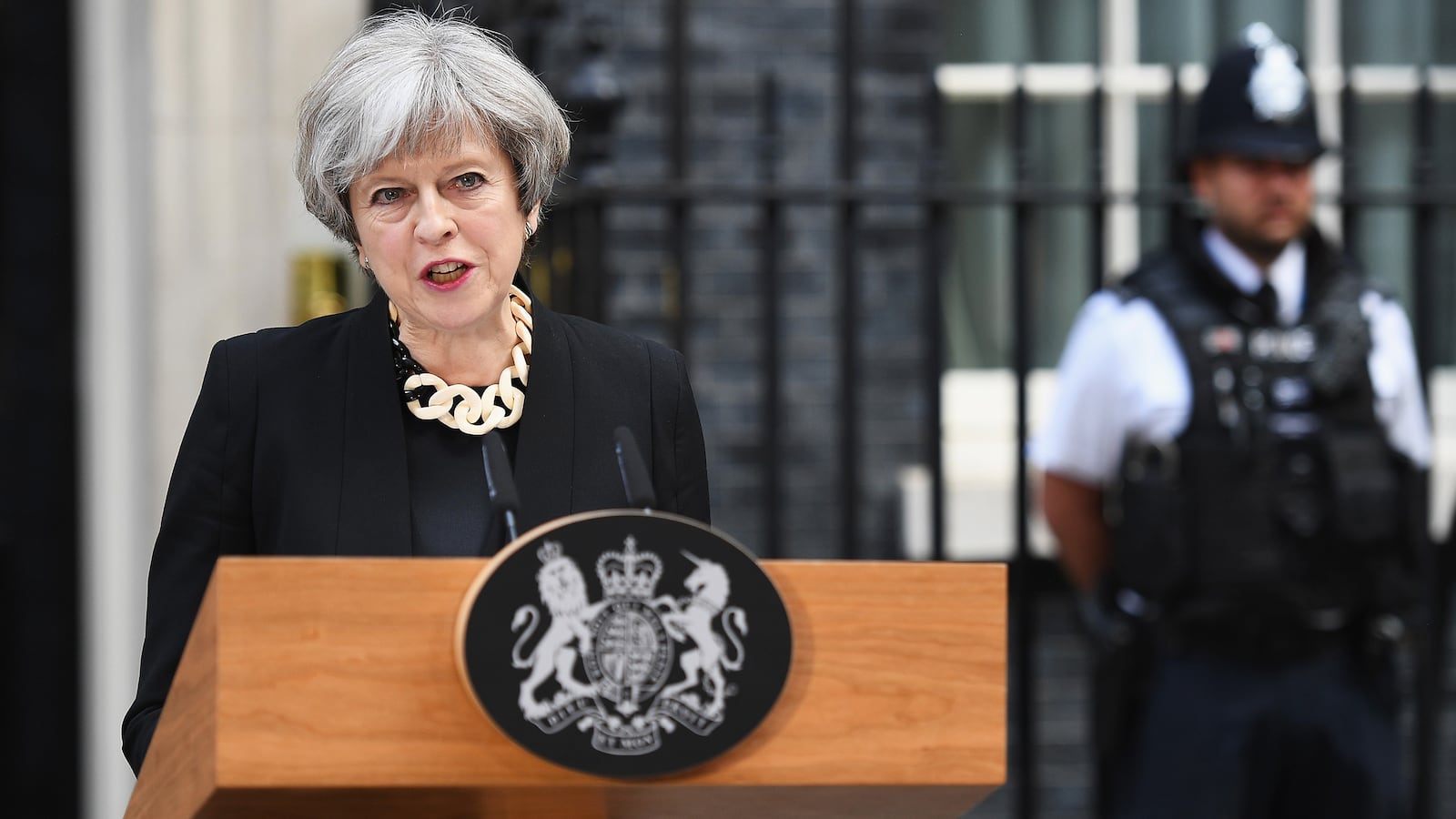U.K. Prime Minister Theresa May was not about to let a good tragedy go to waste. After three ISIS-inspired extremists wreaked havoc on London Bridge days ahead of the election there, she said her government must "work with allied democratic governments to reach international agreements that regulate cyberspace to prevent the spread of extremist and terrorism planning."
This is a classic example of a "Do Something! Anything!" call to action from a beleaguered politician, but even more worrisome is that it isn't merely a spur-of-the-moment overreaction to an act of terrorism.
May's Conservative Party's manifesto, published three weeks ago, explicitly states, "Some people say that it is not for government to regulate when it comes to technology and the internet. We disagree.” The Tory manifesto also declares, "we do not believe that there should be a safe space for terrorists to be able to communicate online and will work to prevent them from having this capability.”
Naturally, it's not just terrorism the U.K.'s party of limited government thinks can be starved of oxygen by government fiat, the Conservatives are also demanding that tech companies "not to direct users – even unintentionally – to hate speech, pornography, or other sources of harm.”
At the very least, the Conservative manifesto deserves credit for its candor, as most of the time it's left to free-speech advocates to make the slippery-slope analogy. Here, the slide from defending the homeland from jihadist terrorism by demanding backdoor government access to encrypted technologies to legislatively commanding Google to prevent its users from accessing porn is laid bare in a just a mere handful of sentences as a pitch to voters.
It's not just the U.K.
Nominally deep thinkers and political leaders all over the world, regardless of ideology and in places as disparate as Israel, Egypt, China, and the United States, also believe that the threat of terrorists — and their ability to activate cells using encrypted messages or recruit through online propaganda videos — represents such a profound threat that both the post-Enlightenment value of free expression (at least in countries where that's ever been valued) and the ever-evolving nature of a free and open internet must be curbed, lest the terrorists win.
The last American presidential election might have been the most divisive in memory, but with regards to waving a dismissive hand at the First Amendment in the name of clamping down on a free internet to fight terrorism, there was barely any daylight between the candidates.
In a speech where she called for "depriving jihadists of virtual territory," Hillary Clinton begrudgingly conceded, "You’re going to hear all of the usual complaints, you know, freedom of speech, et cetera," implicitly painting such complaints as unreasonable. Not to be outdone, in a speech calling for "closing up" parts of the internet to fight ISIS Donald Trump lamented, "Somebody will say, 'Oh freedom of speech, freedom of speech.' These are foolish people."
All this transpartisan, multi-national support for censorship is presented as thoughtful and necessary governance, when it is in fact short-sighted, ill-considered, and designed to convince terror-fatigued citizens that their "leaders" have their best interests at heart.
Supporters of censorship and punitive regulations like to paint their opponents as naïve, but the notion that "international agreements to regulate cyberspace" — as May puts it — can effectively tamp out the "bad guys" ability to express their horrid worldviews without also running roughshod over the civil liberties of the general citizenry is the pinnacle of fanciful thinking.
Jordan — often praised as an example of a "progressive" Middle Eastern dictatorship — has an "anti-terror" law that Pacific Standard reports "is ambiguously written and its vague definition of terrorism leaves journalists—or even everyday citizens using technology—vulnerable to arrest and prosecution before a military, not civilian, court."
Speaking of ambiguously written laws that can easily be abused by bad actors in government, Germany has a proposed law under consideration which would fine social-media companies tens of millions of euros if they do not adequately remove "hate speech" and "fake news" in a timely fashion.
With government free to interpret such nebulous terms as it sees fit, what could possibly go wrong? Ask Jan Bohmermann, the German comedian prosecuted for reciting a poem critical of Turkish President Recep Tayyip Erdogan under a law forbidding German citizens from insulting heads of state. Though Bohmermann's criminal charges were dropped, he is still legally forbidden from reading the poem in public again. That's what a government in a "free country" can do to a citizen whose controversial speech becomes inconvenient to its negotiations with an autocrat.
Ironically, Amber Rudd — Theresa May's successor as U.K. Home Secretary — earlier this year found herself the subject of a legally actionable hate speech complaint filed by an astrophysicist who took issue with a speech Rudd gave about immigrant workers. In a hypothetical situation after May subjects the U.K. to "international agreements to regulate cyberspace," would German laws against hate speech require her own Home Secretary to be censored online? Would French cartoonists be subject to Saudi blasphemy laws? Just how committed to stamping out terrorism are the Tories?
The necessity of such international regulation is also based on the dubious premise that nothing is being done to push back against online jihadism. Tech companies such as Facebook, Google, and Twitter have already taken numerous measures to stamp out "terror-related" content using both automated and user-driven systems to flag and remove such material, primarily because providing a platform for such material is bad for their businesses — no sweeping top-down government edicts necessary.
The sad fact is that terrorists will always attempt to exploit the civil liberties of a free society. But resisting overwrought pleas from governments to increase their own authority to the point that such liberties are but a quaint memory is not weakness, it is the necessary resolve to remain free in the face of barbarians.
ISIS and their minions are murderous cowards and thugs following a nihilistic death cult, but they're not an existential threat unless we choose to make them so. No government has ever proven itself so enlightened that it won't abuse emergency measures introduced in times of war, and "the free world" faced down the literal existential threat of the Axis Powers without permanently sacrificing free expression on the altar of security.
If you don't want terrorism to destroy our way of life, don't believe the politicians who insist that once you forfeit your freedoms you'll be safe, because you won't ever be truly immune from violence and you won't ever get those freedoms back.






